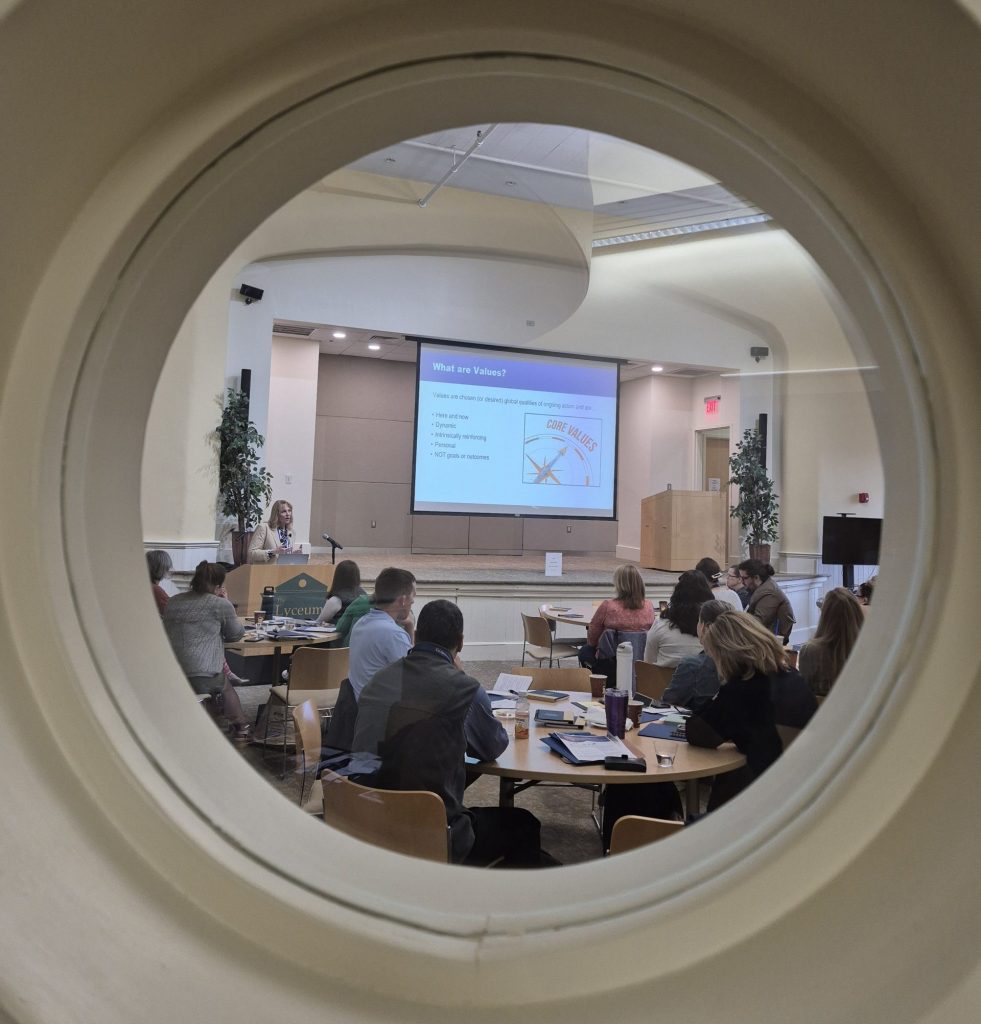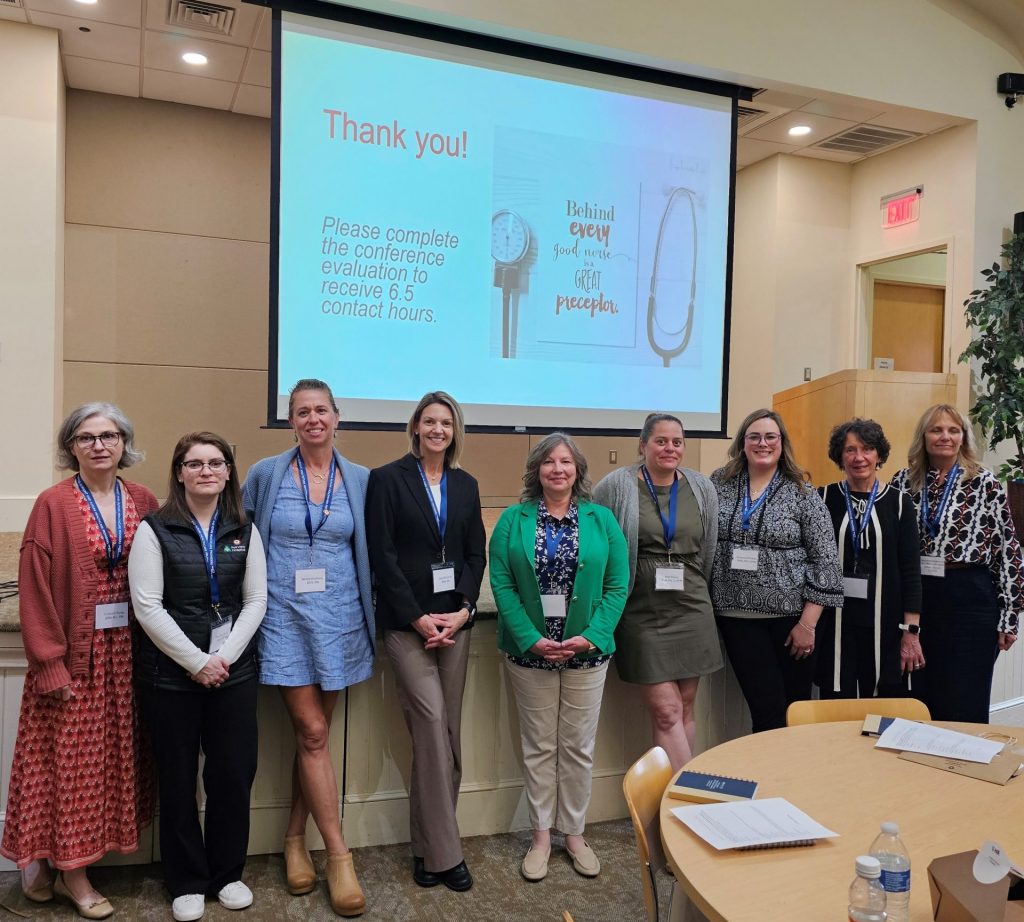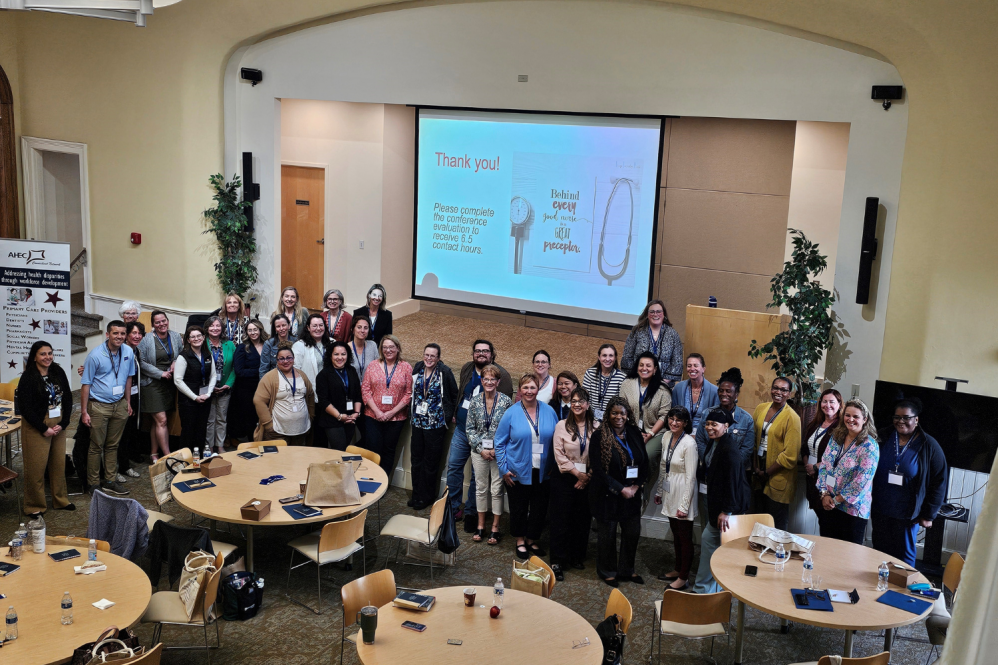Student nurses, new graduate nurses, and nurses transitioning to a new clinical area rely on clinical nurse preceptors to help them successfully move into their new roles. Clinical nurse preceptors help train and retain nurses by providing one-to-one oversight and guidance; however, they are in short supply and training and support for the ones already in this role is inconsistent and often lacking.
To address this gap, the Connecticut Area Health Education Network (CT AHEC) based at UConn Health, through its affiliation with the New England Nursing Clinical Faculty and Preceptor Academy (Academy), a $4 million Health Resources and Services Administration (HRSA) project, provided 30 Connecticut nurses with a free one-day conference on clinical nurse precepting skills on May 14.
 “The CT AHEC program is grateful for the opportunity to support nursing professionals as a means of addressing health disparities through workforce development. Effective collaboration with key stakeholders is critical for maximizing fiscal resources, expertise, and delivery of continuation for all healthcare disciplines,” said Petra Clark-Dufner, CT AHEC Director.
“The CT AHEC program is grateful for the opportunity to support nursing professionals as a means of addressing health disparities through workforce development. Effective collaboration with key stakeholders is critical for maximizing fiscal resources, expertise, and delivery of continuation for all healthcare disciplines,” said Petra Clark-Dufner, CT AHEC Director.
The Academy’s objective is to develop and support preceptors and clinical faculty to strengthen and grow the nursing workforce at all levels across all settings. Nurse who precept in hospitals, community health, ambulatory care, public health, universities, and corrections were in attendance. UConn Health nurse Deisy Velez, MSN, RN, CMSRN, WCC, participated and said: “On my table we had an LPN, a nurse from Yale whose role was very similar to mine, an in home/ visiting nurse and two APRNs. All from very diverse backgrounds; but sitting together ready to learn the skills to help our peers. The activities given were engaging and allowed us to process and practice the ideas and tools given to us.”
63% of the participants found the content “extremely useful”, and 52% reported that their knowledge regarding roles, responsibilities, and core competencies of clinical nurse precepting increased a “great deal.” UConn Health labor and delivery nurse Diane Fallon, RN, C-HROB, C-EFM, commented that the conference “stocked my toolbox with evidence-based guidelines to use when I want to encompass the many roles of a nurse preceptor.”
The conference presenters included seven nurses from Fairview Hospital (Berkshire, MA) and one nurse from the University of Connecticut. The Fairview Hospital nurses had participated in the Academy’s Teaching of Tomorrow program where they attended two weekend conferences focused on building and refining foundational skills for effective clinical teaching alongside other health professionals. They took their learnings and developed their own nurse-targeted training presentation. Participants earned 6.5 contact hours through the Connecticut Nurses Association.
Minela Jasarevic, LPN, the vaccine coordinator at Charter Oak Health Center (Hartford), commented: “While hands-on experience is key, having a clear framework to follow when precepting is very helpful. A structure system ensures that important teaching steps aren’t missed and that feedback and assessment are consistent. Having tools to guide feedback, track trainee progress, and outline expectation can make the precepting experience smoother and more effective.”

This activity was jointly provided by The Berkshire Area Health Education Center (AHEC), The Connecticut Area Health Education Center (AHEC) Network, and The UMass Chan Medical School/Tan Chingfen Graduate School of Nursing New England Nursing Clinical Faculty and Preceptor Academy with funding by the Nurse Education, Practice, Quality, and Retention – Clinical Faculty and Preceptor Academies program grant from the Health Resources and Services Administration administered by the UMass Chan Medical School/Tan Chingfen Graduate School of Nursing in Worcester, MA in collaboration with partners across New England and support from the Connecticut Student Loan Repayment Program (CT SLRP), housed at the CT AHEC office at UConn Health.
CT SLRP’s support included current information on federal nurse loans, like the National Health Service Corps, Nurse Corps, as well as local/regional private resources available for refinancing and employer programs, such as CHESLA (Connecticut Higher Education Supplemental Loan Authority) and RISLA (Rhode Island Student Loan Authority).
Krystal Nunziata, RN, from the Cornell Scotte Health Center (New Haven) summed up the value of her day of training by saying: “There is definitely a need to train nurse preceptors. Preceptor training can benefit all nurses by providing them with the tools and confidence to effectively mentor others. It can inspire those who may not have previously felt capable of taking on a leadership or mentorship role and also further develop the skills of those already precepting.”



